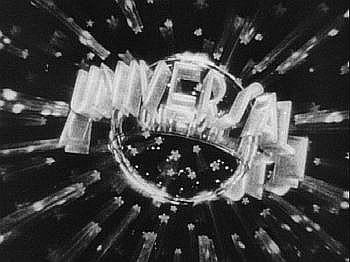 One thing I didn't mention about Shadow of a Doubt is the production company: It was produced by Skirball Productions, and distributed by Universal Pictures. Having been released in 1943, it means that the opening shot is of Universal's "mirrored ball" logo with an art deco font, as can be seen in the photo on the left. It's also the first time in a long time that I can remember that this logo has shown up on TCM. Later logos, such as the "Universal International" logo with its ridiculous serifs, or the "Universal, an MCM Company" logo have shown up a bit more often, but still fairly rarely.
One thing I didn't mention about Shadow of a Doubt is the production company: It was produced by Skirball Productions, and distributed by Universal Pictures. Having been released in 1943, it means that the opening shot is of Universal's "mirrored ball" logo with an art deco font, as can be seen in the photo on the left. It's also the first time in a long time that I can remember that this logo has shown up on TCM. Later logos, such as the "Universal International" logo with its ridiculous serifs, or the "Universal, an MCM Company" logo have shown up a bit more often, but still fairly rarely.
Why is it that the older Universal movies have shown up so rarely on TCM? Part of the reason is of course monetary; the various channels have to pay for the brodacst rights to the movies they wish to show, and it's to be expected that with some movies, other channels will outbid TCM. However, I can't help but wonder if there are other factors at work:
The later Universals show up slightly more often. In 1946, Universal merged with International in a complex deal (hence the "Universal International" logo I mentioned above), and these later movies show up slightly more regularly than the older Universals.
Also, there are the Paramount pictures owned by Universal. In the mid 1950s, the Music Corporation of America (MCA) bought the TV broadcast rights to most of Paramount's talkies released before 1950. (At the time, nobody thought people would want to watch silent movies on TV.) These show up once in a while, too (eg. A Farewell to Arms earlier this month), again seemingly a bit more frequently than the pre-War Universal movies.
A few other movies Universal has more recently obtained the rights to (eg. 1960's Psycho) have also appeared more regularly than the early Universals; these have an updated Universal logo including the company's web address. (Compare this to the Columbia library, most of which pictures have an updated "Sony Pictures Television" logo tacked on at the end.)
In addition to Shadow of a Doubt, TCM has scheduled Alfred Hitchcock's Saboteur for March. Like Shadow of a Doubt, this was distributed by Universal, and so has the mirrored globe logo; however, also like Shadow of a Doubt, it has another production company on the credits along with Universal. At the time, Hitchcock was under contract to David O. Selznick (as can be seen in the small print in the opening to Shadow of a Doubt); perhaps there is something different about the Hitchcock movies that causes them to have a different set of broadcast rights and entities that need to be paid royalties, and that's why they can be shown, but not most of the other Universals.
Or are the folks at NBC Universal simply that stingy or ignorant? Considering the booming business they seem to be doing releasing various TV shows on DVD, and the amount of product they have, it is possible that they don't realize what they're sitting on. And finally, it would also be possible that, having so much product, they'd have to convert it into a medium that can be broadcast on TV. (Many old TV shows that still exist are on kinescopes, and no modern TV outlet that I know of has the capability to play these directly.)
But still, something is up with TCM's relationship with Universal that doesn't seem to be up with the other studios. What is it?
Grace Kelly
3 hours ago

No comments:
Post a Comment